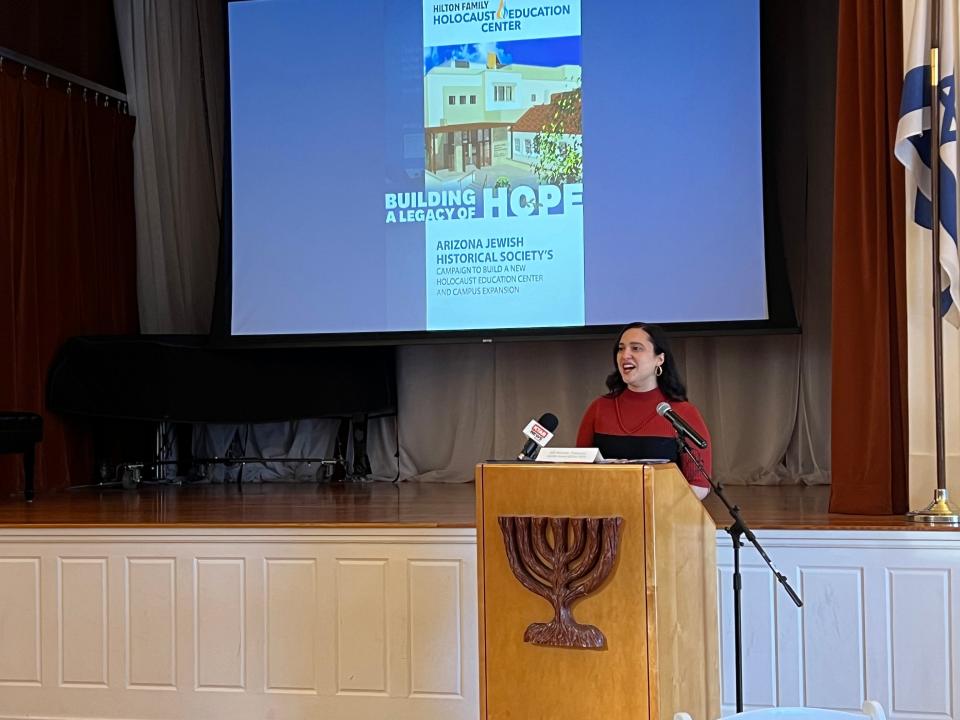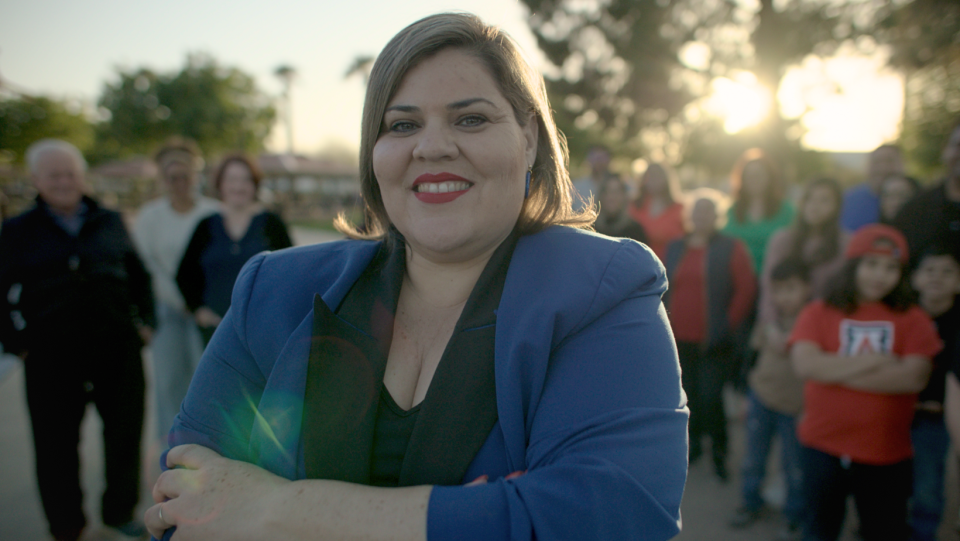Israel war a touchy subject in Arizona congressional primary: Where Ansari and Terán stand
- Oops!Something went wrong.Please try again later.
- Oops!Something went wrong.Please try again later.
The frontrunners in the highly watched race to replace Rep. Ruben Gallego in Congress are treading cautiously on the Israel-Hamas war as Israel's military campaign in Gaza stretches into its third month.
The war has bitterly divided Democrats in recent weeks, as some call to rally behind Israel following the Oct. 7 attacks by the Palestinian militant group Hamas, which killed nearly 1,200 people in Israel and took more than 200 hostages.
Others are objecting to Israel’s military response which, according to the Hamas-run Ministry of Health, has killed around 18,000 people, or nearly 1% of Gaza’s population, and has employed what President Joe Biden on Tuesday called “indiscriminate bombing.”
With political experience at only the state or local level, neither congressional candidate has a robust voting record on foreign policy, and both declined to discuss the topic with The Arizona Republic. But their prior public statements, social media posts and campaign materials give an indication of where the two candidates stand.
One candidate, Phoenix Vice Mayor Yassamin Ansari, has outlined a draft platform that advocates for continuing to deliver U.S. aid to Israel without additional conditions; U.N. aid for Palestinians; and working towards a two-state solution, according to a copy of the document obtained by The Republic.
The other frontrunner, former state senator and Arizona Democratic Party chair Raquel Terán, did not directly answer emailed questions.
In the background of the race is the political clout of large pro-Israel organizations such as the American Israel Political Action Committee and the Democratic Majority for Israel, or the more progressive group J Street. A top spender in Democratic primaries in 2022, AIPAC reportedly is stepping up its efforts to oust lawmakers who are highly critical of Israel.
Marshall Wittmann, a spokesperson for AIPAC, wrote in a statement to The Republic that “we are currently in the process of evaluating races nationally and haven’t yet made a decision on this district.”
Wittman has told the Washington Post that the organization’s “sole criteria” for supporting candidates of either political party is “their position on supporting the U.S.-Israel relationship.”
Here’s where both candidates stand.
Phoenix Vice Mayor Yassamin Ansari
Ansari supports a two-state solution between Israelis and Palestinians, according to a draft of her platform obtained by The Republic. The campaign confirmed that the document was the most recent draft of her position, but said that it was still “subject to revisions.”
Ansari holds degrees in international relations from Stanford and Cambridge universities, and worked at the United Nations before she entered politics.
In the platform, Ansari calls for continued U.S. military aid to Israel without additional conditions, arguing it represents a “strategic investment” in the region “without needing troops on the ground.” She supports the delivery of U.N. aid to alleviate “disastrous conditions” in the West Bank and Gaza, pursuant to a Trump-era law designed to reduce Palestinian forces’ incentive for terrorism. And she believes the possibility of Iran acquiring a nuclear weapon — the subject of her undergraduate thesis at Stanford — would be an “existential threat” to Israel and the world.

Those views are generally in line with most Democrats' positions.
While outlining the conditions needed to achieve a two-state solution, the position paper appears to endorse the view, commonly held in the international community, that Israeli settlers have violated international law in Palestinian territory.
“To achieve (peace) on the Palestinian side, it means the basic recognition that Israel has a right to exist; an end to all terrorism, and an end to the anti-Semitic positions of Hamas and Palestinian political leadership,” her platform reads. “Israel too has steps it needs to take towards peace, no new settlement expansions and no more unlawful evictions or demolitions of homes. This will put both sides in a stronger position to achieve peace.”
In another passage, Ansari describes the state of public discourse on the issue as “passionate and polarizing,” saying, “where I am concerned is if one advocates for the safety and self-determination of the Palestinian people, they are unfairly deemed antisemitic.”
“Likewise for those that stand up for the safety of Jewish people. They should not be unreasonably labeled as heartless towards the plight of Palestinians,” the paper continues.
Ansari’s social media history suggests that she has been sympathetic to the pro-Palestinian viewpoint in the past. During the 2014 Gaza War, Ansari tweeted in support of the commentator Fadi Elsalameen after he appeared on CNN to criticize the steep humanitarian cost of Israel’s military efforts.
“Major props to @Elsalameen for calling attention to the humanitarian crisis in Gaza. Not something you see every day *or ever* on CNN,” Ansari wrote.
In a previous interview with The Republic, Ansari named her support of Israel as a key reason why she was unsure whether she would join the House Progressive Caucus. Some of the caucus’ members have voted against sending U.S. military aid to Israel over objections of their treatment of Palestinians and alleged violations of internal law.
Former state Sen. Raquel Terán
Terán declined to answer specific questions about the issue, such as whether she supports an indefinite ceasefire between Israel and Hamas in the conflict or whether the U.S. should put conditions on aid to Israel.
In a statement provided by the campaign, she voiced support for the temporary pause in fighting achieved in late November, and expressed an interest in restoring a longer-lasting peace.

“Human life is precious, both Israeli lives — including the hostages ― and Palestinian lives, and I have been devastated by the toll civilians have paid. The Hamas leaders who planned the October 7th terrorist attacks must be held accountable for the atrocities committed. And we must do everything possible to ensure the release of hostages, protect civilian lives, and deliver aid to Gaza,” she wrote.
“I welcomed the deal that led to a temporary pause in fighting and violence, the release of dozens of Israeli hostages, and the delivery of substantial humanitarian aid like food, medicine, and safe shelter to be delivered to innocent civilians in Gaza. I urge negotiators to restore this agreement in order to save lives and work toward a framework for enduring peace in the region.”
Terán has been endorsed by the Working Families Party, a minor political party that advocates for progressive economic and political reforms. They have called for a ceasefire between Israel and Hamas and have criticized AIPAC’s influence in U.S. politics.
Sitting lawmakers endorsed by WFP include Democratic Rep. Cori Bush of Missouri, a strident critic of Israel’s military action, and Democratic Sen. Elizabeth Warren of Massachusetts, who has said that Israel needs to minimize harm to civilians in its ongoing military campaign but has not called for a permanent ceasefire.
Previously, Ansari has criticized Terán for voting against an Arizona Senate bill that would have had local law enforcement collect information on criminal offenses motivated by anti-semitism. In response, Terán noted that her vote aligned with a majority of Democratic state senators and the ACLU, who argued at the time that the bill’s definition of anti-semitism could infringe upon what they felt was legitimate criticism of Israel.
Laura Gersony is a national politics reporter for The Arizona Republic and azcentral.com. Contact her at 480-372-0389, or by email at lgersony@gannett.com. Follow her on X, formerly known as Twitter, at @lauragersony.
This article originally appeared on Arizona Republic: Here's where Yassamin Ansari and Raquel Terán stand on the Israel war

